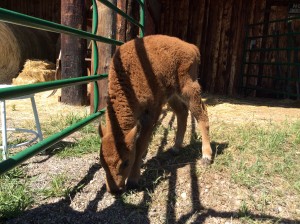For over three million years, humanity, in all its evolutionary forms, has studied animals. People study animals for several reasons. First, animals are food. The better you understand an animal, the better you can hunt it. Second, animals are our beloved companions. The human-animal bond is one of the most powerful bonds in the world. Third, in the case of domesticated animals, they are both beloved companions and food.
As people who live and work with animals every day, we find the article below very interesting. We suspect the problem with determining animal intelligence rests with the IQ tests humans give animals. Bison, for example, are extremely intelligent. But a researcher who hides in the grass or trees with a camera rarely “gets” it, because he/she never gets beyond the status of an observer. In the eyes of a bison, anything that hovers at the edges of the herd, just watching, is suspicious. That’s predator behavior. That’s exactly what wolves and mountain lions do. Understandably, bison treat “watchers” with caution. The researcher is never allowed to get inside the buffalo circle of friends. Our opinion is that if the animal doesn’t trust you, you will never really understand the animal’s mind–meaning its intelligence–because the animal can’t be itself around you. It’s only when the researcher is considered part of the herd that bison feel comfortable enough to freely interact with each other, the researcher, and their world. Jane Goodall demonstrated this principle many years ago with the Gombe chimps. It takes years of being part of the animals’ community before a researcher even has an inkling as to how they really think.
In our opinion.
The researcher’s opinion of people like us, by the way, is that we are too close to the animals–meaning emotionally blinded by our love for the animal–to be able to accurately evaluate their behavior. Researchers say that people like us “anthropomorphize” our animals, which means we attribute human thoughts and emotions to our animals where they do not exist.
What do you think about animal intelligence?

